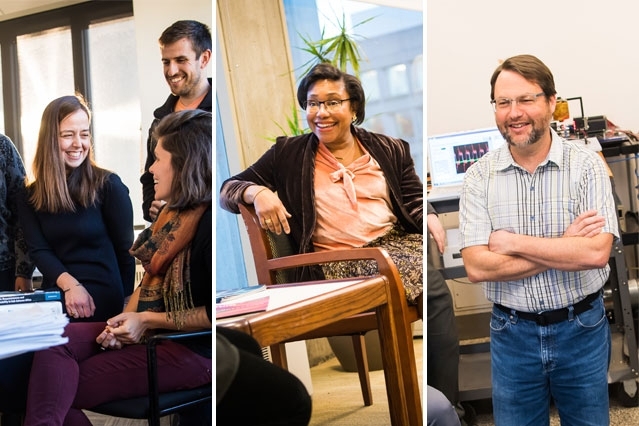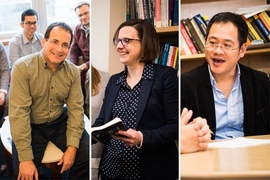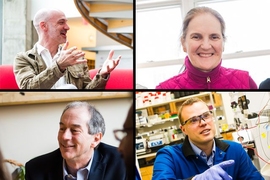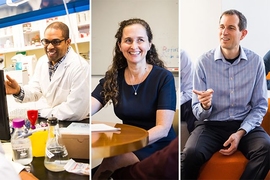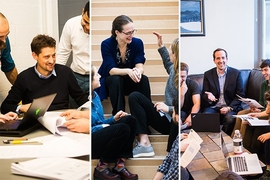Faculty mentors Gabriella Carolini, Paula Hammond, and David Trumper are known for guiding students through the trenches of graduate school — one decision at a time.
Students encounter various obstacles in graduate school, many of which are unexpected. Selecting a research project may become an all-consuming task. Starting a family in graduate school may be both the best and the most-daunting decision.
In addition to helping graduate students make choices, caring faculty mentors demonstrate support for the decisions graduate students make on their own and affirm that no obstacle is insurmountable. Through such acts of validation, these professors help to cultivate graduate students as productive and confident researchers.
For this reason, among others, Carolini, Hammond, and Trumper have been honored as Committed to Caring (C2C).
Gabriella Carolini: making extraordinary the norm
One student extols Gabriella Carolini as “the single most-defining influence in my MIT experience to date.” This sentiment is far from an outlier.
Associate professor in the Department of Urban Studies and Planning (DUSP), Carolini’s research focuses on the planning, implementation, and administration of infrastructure systems in vulnerable urban and peri-urban communities. Her work, largely based in sub-Saharan Africa and Latin America, examines how financing, project partnering practices, and project evaluations impact distributive justice in urban development, particularly with regard to water and sanitation services as well as community health.
Carolini builds community in the DUSP International Development Group by sharing her own experiences with her students, and in doing so “fosters a friendly and inclusive work environment” (a C2C mentoring guidepost).
One nominator remarks that Carolini’s “candor in sharing her experiences as a tenure-track female academic” has helped inform the student’s own career decisions. Another nomination describes Carolini as honest about the ups and downs of academia, including the tenure process, the management of research projects and publications, and family-work life balances.
When an international graduate student and his wife were expecting a baby, Carolini — pregnant herself at the time — went out of her way to demonstrate her concern and personally provide support for them. Her actions made them feel like they “had a community to rely on at MIT.” This was especially appreciated in light of the current political climate, in which many international students have felt destabilized and socially isolated.
In considering general obstacles for her students, Carolini explains that “choice” is perhaps their toughest hurdle. “Making a decision about what specific questions or issues to commit to is a perennially difficult challenge our students face. They are talented and able — so we understand why. But we all still have to choose to move forward.”
Faculty members, Carolini says, need to help students find and commit to their research and professional practice aspirations. It helps when faculty members demonstrate excitement about students’ work and help them to develop a plan towards achievement. To Carolini, this means recognizing both the strengths and weaknesses of a project, and addressing the latter “without losing sight of the value of their work.”
Paula Hammond: individual and departmental advancement
Paula Hammond excels at actively listening to her students, helping her students move successfully through their programs, and improving departmental systems to encourage diversity and inclusion.
Hammond is head of the Department of Chemical Engineering and the David H. Koch (1962) Professor in Engineering at MIT. The Hammond Research Group at the MIT Koch Institute for Integrative Cancer Research focuses on the self-assembly of polymeric nanomaterials, including the use of electrostatics and other complementary interactions to generate multifunctional materials with highly controlled architecture.
Her work has a number of electro-optical, electro-mechanical, and biological applications. In cancer research, for example, the Hammond lab works on the generation of polymer-based films and nanoparticles for drug delivery.
Whether students are struggling with qualifying exams or unproductive data, Hammond assures her students that their obstacles can be overcome. “I let them know that there is a path to a PhD here and we’re going to find it.” This sets students at ease, and alleviates much of the stress. Hammond says that all these challenges are “part of the journey, and everyone experiences them — we just need to get out on the other side of it.”
Hammond provides channels for students to express their difficulties (a C2C mentoring guidepost). She says that during a recent departmental retreat, “we learned that there is a gendered experience for women in our department.” As department head, Hammond has set out to learn how this climate can shift into “one in which women feel equally recognized and equally able as soon as they walk in the door.”
According to C2C nominators, Hammond makes every effort to empower students from diverse backgrounds. This is perhaps best illustrated by her ongoing commitment to the MIT Summer Research Program (MSRP). By welcoming MSRP interns into her lab, Hammond gives her own graduate students valuable experiences mentoring potential future labmates.
“I feel a responsibility as a woman, and as an underrepresented minority to be visible to others,” Hammond says. “I want to say, ‘There are people who look like you and have similar backgrounds to you doing this work.’”
David Trumper: champion of balance
David Trumper is a reliable guide for his students, who say that he invariably “encourages us to do what we are passionate about and supports us in any way he can.”
As professor of mechanical engineering, Trumper’s research investigates the design of precision mechatronic systems, magnetic levitation for nanometer-scale motion control, and novel actuation and sensing devices. As director of the Precision Motion Control Laboratory, Trumper works with his group to conduct research in the design of electromechanical systems for precise positioning applications, such as semiconductor photolithography, high-speed machine tools, and scanned probe microscopy.
According to his students, Trumper takes the time to sit down and listen, not just as a professor or advisor, but also as a friend. One nominator wrote, “we talked about the loss of my dad, about the presidential election, about life in general, and about life at MIT. It was the most encouraging and helpful experience that I have ever had with an MIT professor.”
In addition to promoting a healthy work/life balance (a C2C mentoring guidepost), Trumper’s students say he constantly stresses balance of every kind, for example “between creative thinking and precise detailing, between analysis and learning from prototyping, and between going fast and slowing down.”
Trumper demonstrates to his students that balance is important, and ultimately more effective for everyone. He encourages his students to make time for creative efforts and physical activities. Trumper leads by example, spending time photographing, hiking, and rock climbing. “I also encourage my students to be more broadly educated by reading books that have nothing to do with their technical field,” he relays. “Reading for pleasure should be a lifelong habit.”
Along with balance comes perspective, and Trumper is always offering a positive outlook. One student recalls that after making a careless calculation, his experiment failed. Trumper “did not criticize me once about the mistake, and instead, he simply said: ‘Now you will never forget this, which is great’.”
More on Committed to Caring
The Committed to Caring (C2C) program is an initiative of the Office of Graduate Education and contributes to its mission of making graduate education at MIT “empowering, exciting, holistic, and transformative.”
C2C invites graduate students from across MIT’s campus to nominate professors whom they believe to be outstanding mentors. Selection criteria for the honor include the scope and reach of advisor impact on the experience of graduate students, excellence in scholarship, and demonstrated commitment to diversity and inclusion.
By recognizing the human element of graduate education, C2C seeks to encourage excellent advising and mentorship across MIT’s campus.
